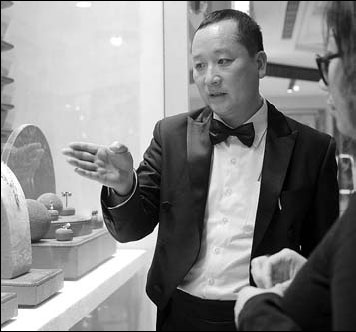'Old clerks' get new role showing rich how to shop
Updated: 2013-03-21 07:35
By Xu Junqian (China Daily)
|
||||||||
|
Qiu Zhengguo, 48, has mastered the art of guiding shoppers in malls to find what their hearts desire. Gao Erqiang / China Daily |
Qiu Zhengguo is the best-kept secret in the fast-growing fashion and luxury industry for some of the most cash-clad people in Shanghai.
He is a senior guide for a luxury shopping mall. Called Captain of the Housekeeping Department, he is one of the few in the industry.
"The city is full of bright shop windows and up-to-date fashion items, just like in Paris, London and New York," says 48-year-old Qiu. "But what is missing is someone behind the glass who doesn't try to sell, but tells of the beauty of each of these masterpieces like a museum docent."
Last September, the then newly opened Yifeng Galleria on the Bund placed a job advertisement in local newspapers for senior luxury shopping guides. As one of the landmarks in Shanghai, Yifeng houses some of the world's most famous brands including Bottega Veneta, Gucci and Pomellato.
"Yifeng Galleria is special because it houses some very exclusive brands in the market, which some customers may not be familiar with," says Ye Qizheng, editor-in-chief of Fashiontrenddigest.com, one of the leading fashion websites in China. The shopping complex is housed in a century-old building overlooking the Huangpu River.
Qiu says he is not surprised that "old die-hards" like him are well embraced in this fast-growing and emerging industry.
Instead of looking for someone young, energetic, and handsome, the galleria decided to go for someone mature "to match the style of the building".
The job advertisement has these requirements: male, aged between 40 and 50, Shanghai native, and preferably a laokele: Shanghai dialect for "old clerk", a well-respected job in the golden age of the city in the 1920s. The word later also referred to the refined lifestyle of gentlemen with good pay and family upbringing.
"When you say laokele, what comes to mind is a classy lifestyle pursued by people who buy luxuries. For Shanghai locals, the word means good taste, good manners and having the knowledge of how to have a better life," Ye says.
The captain does not collect a commission if anyone makes a purchase during their tour. His main task is to bring in customers to the boutiques he or she is interested in, and introduce the products displayed inside.
Hu Ying, assistant marketing manager of Yifeng says the company borrowed the idea from the hotel industry overseas. "A butler aged above 50 is very common overseas, and we believe seniority exudes profundity and trust," she says.
More than 50 people answered the advertisement, with Qiu - a former five-star hotel staff member who has been in the service industry ever since the country introduced its reform and opening-up policy in the late 1970s - and another candidate winning the job.
"I guess it's my experience in the service industry that won me the job," says Qiu, looking neat in his long-tailed black tuxedo.
When he is not on duty, Qiu prefers to keep quiet.
But once he is at his post, his professionalism comes into play. He is cordial and modest, and greets every guest with a smile and pleases every guest with the answers he provides.
Having lived just "two minutes by foot" from the building since he was born, Qiu is practically a walking map and history book of the Bund. He is familiar with the past and present of every brick along the promenade.
And when he is inside the mall, the man can enumerate around 80 percent of the items more fluently than most of the shop assistants.
"I love being with beautiful things, they have gradually grown on me," says Qiu, who remains rather evasive about his salary, saying money is not everything.
But to "be with these beautiful things", Qiu is also very demanding with himself so as to "be well matched with them".
He changes from the tux to his casual clothes before every meal as he does not want to stain his uniform or smell of food. He also brushes his teeth and washes his face after every meal.
Qiu describes his clientele as the best well-off people in the Yangtze River Delta who "don't squander tens of thousands of yuan on a gadget only to show off their wealth, but are those who pursue a better lifestyle, or at least try to."
"They are not those who only look at price tags. They listen to the story behind the goods," says Qiu.
Real estate tycoons and the second-generation rich make up the largest group of Qiu's customers.
"Most of them are very polite and kind. I think it depends on your attitude toward them - a genuine smile invites goodness," he adds.
xujunqian@chinadaily.com.cn
(China Daily 03/21/2013 page20)

 In Photos: 7.0-magnitude quake hits Sichuan
In Photos: 7.0-magnitude quake hits Sichuan
 Li Na on Time cover, makes influential 100 list
Li Na on Time cover, makes influential 100 list
 FBI releases photos of 2 Boston bombings suspects
FBI releases photos of 2 Boston bombings suspects
 World's wackiest hairstyles
World's wackiest hairstyles
 Sandstorms strike Northwest China
Sandstorms strike Northwest China
 Never-seen photos of Madonna on display
Never-seen photos of Madonna on display
 H7N9 outbreak linked to waterfowl migration
H7N9 outbreak linked to waterfowl migration
 Dozens feared dead in Texas plant blast
Dozens feared dead in Texas plant blast
Most Viewed
Editor's Picks

|

|

|

|

|

|
Today's Top News
Live report: 7.0-magnitude quake hits Sichuan, heavy casualties feared
Boston suspect cornered on boat
Cross-talk artist helps to spread the word
'Green' awareness levels drop in Beijing
Palace Museum spruces up
First couple on Time's list of most influential
H7N9 flu transmission studied
Trading channels 'need to broaden'
US Weekly

|

|








